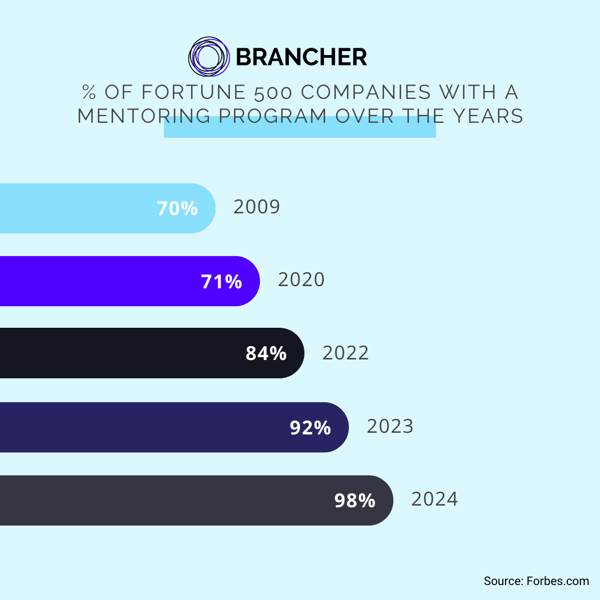
Mentoring has seen significant growth over the years. In 2020, the number of Fortune 500 companies with a mentorship program was only 71%. This has grown to 84% in just a couple of years. In 2023, this number further increased to 92%. And in 2024, the number of Fortune 500 companies with a mentoring program has skyrocketed to 98%. What are the other mentoring statistics in 2026 that are worth noting?
In this article, we’ll be talking about how mentoring has become the third focus of Learning and Development (L&D) in LinkedIn Learning’s 2024 Workplace Learning Report. Here’s the latest data available:
Mentoring Statistics in 2026: Effect of Mentoring in Organisations
- 97% say mentoring is valuable but out of that number, only 15% have a mentor. 55% believe mentoring can help them succeed. (Source)
- 93% of small and medium-sized businesses acknowledge that mentoring can help them to succeed. (Source)
- Only 25% of small and medium-sized businesses currently make use of business mentors. (Source)
- 67% of businesses reported an increase in productivity due to mentoring. (Source)
- 55% of businesses felt that mentoring had a positive impact on their PROFITS. (Source)
- Reskilling current employees can save organisations 95,800 AUD per employee compared to recruiting new employees. (Source)
- Since the COVID-19 pandemic, there has been a 30% increase of mentoring initiatives at organisations. (Source)
- 77% of HR and L&D professionals say formal mentorship will be somewhat or extremely critical to employee development in 2026, reflecting its growing importance in workplace learning strategies. (Source)
- A 2026 enterprise L&D trends report highlights mentorship alongside leadership, critical thinking, and skills development as essential in helping employees adapt to workplace transformation; especially in an era reshaped by AI. 77% of organizations view mentorship as a key human-centric learning mechanism. (Source)
How Mentoring Affects Career Development
- Employees who received mentoring were promoted five times more often than those who didn’t have mentors. (Source)
- Mentors, on the other hand, are six times more likely to be promoted. (Source)
- 87% of mentors and mentees feel empowered and have greater confidence thanks to their mentoring relationships. (Source)
- 84% of CEOs in formal mentoring programs said mentors had helped them avoid costly mistakes and become proficient in their roles. (Source)
- 71% of mentored employees say their company provides them good opportunities for career growth as opposed to 47% of those without a mentor. (Source)
- 89% of employees in a mentoring program believe their work is being valued by their colleagues compared to 75% who don’t have mentors. (Source)

How Mentoring Impacts Employee Retention
- A 2012 research shows that a lack of mentoring is one of the main reasons that an organisation’s most talented employees decide to leave. (Source)
- In 2019, a study revealed that more than 4 in 10 workers who don’t have a mentor have considered quitting their job in the past three months, compared with just 25% of those who have a mentor. (Source)
- Retention rates were significantly higher for mentees (72%) and for mentors (69%) than for employees who did not participate (49%). (Source)
- A 2018 study found that mentoring led to 20% lower turnover in organisations. (Source)
- 91% of employees with mentors report higher job satisfaction, pointing to engagement benefits beyond formal training. (Source)
How Important is Mentoring to Millennials
- A 2021 study found that over 60% of younger employees (aged 18-44) want additional access to mentoring and coaching, and more than 70% (aged 18-44) want additional opportunities to build relationships with colleagues when compared to their peers aged 45-60. (Source)
- The same 2021 study found that over 60% of respondents would consider leaving their current company to join one with more opportunities for mentorship. 65% of younger employees (aged 18-44) agree or strongly agree with this statement, compared to 31% of those aged 45-60. (Source)
- When starting a new job, 54% of millennials feel disappointed with the lack of personal development training opportunities available to them. (Source)
- A study revealed that only 28% of millennials are committed to staying at their current job after five years. (Source)
How Important is Mentoring to Gen Z?
- 87% want to land a job that can teach them a lot. (Source)
- 83% of individuals want to learn new skills so they can do better in their current roles. (Source)
- 83% want their supervisors to be more caring about their lives (Source), while 21% say they want their bosses to be capable of mentoring them. (Source)
- 76% value learning as a key to their career advancement. (Source)
- 73% of individuals want to learn one-on-one. (Source)
- 64% of Gen Z believe an “opportunity for career growth” is a top priority in their careers. (Source)
How Mentoring Affects Diversity, Equality, and Inclusion (DEI)
- Mentoring programs boosted minority representation at the management level from 9% to 24%. (Source)
- 74% of minorities participate in mentoring programs when they are offered; 32% highly value mentoring. (Source)
- 72% of DiversityInc Top 50 companies have mentoring programs. (Source)
- 24% increase in minority representation
- A company’s level of diversity affects the decisions of 77% of Gen Z individuals. (Source)
- Mentoring has helped promote and improve retention rates for minorities and women from 15% to 38% as opposed to employees who did not get mentored. (Source)
- Women are more likely to get a mentor than men (54% vs 48%). (Source)
- Organisations with formal mentoring programmes in place have 20% higher representation of diverse employees in leadership roles. (Source)
These are just some of the latest statistics on mentorship worth noting. If you want to implement mentorship programs for your organisation, you can book a demo with us and see our mentoring software in action.





